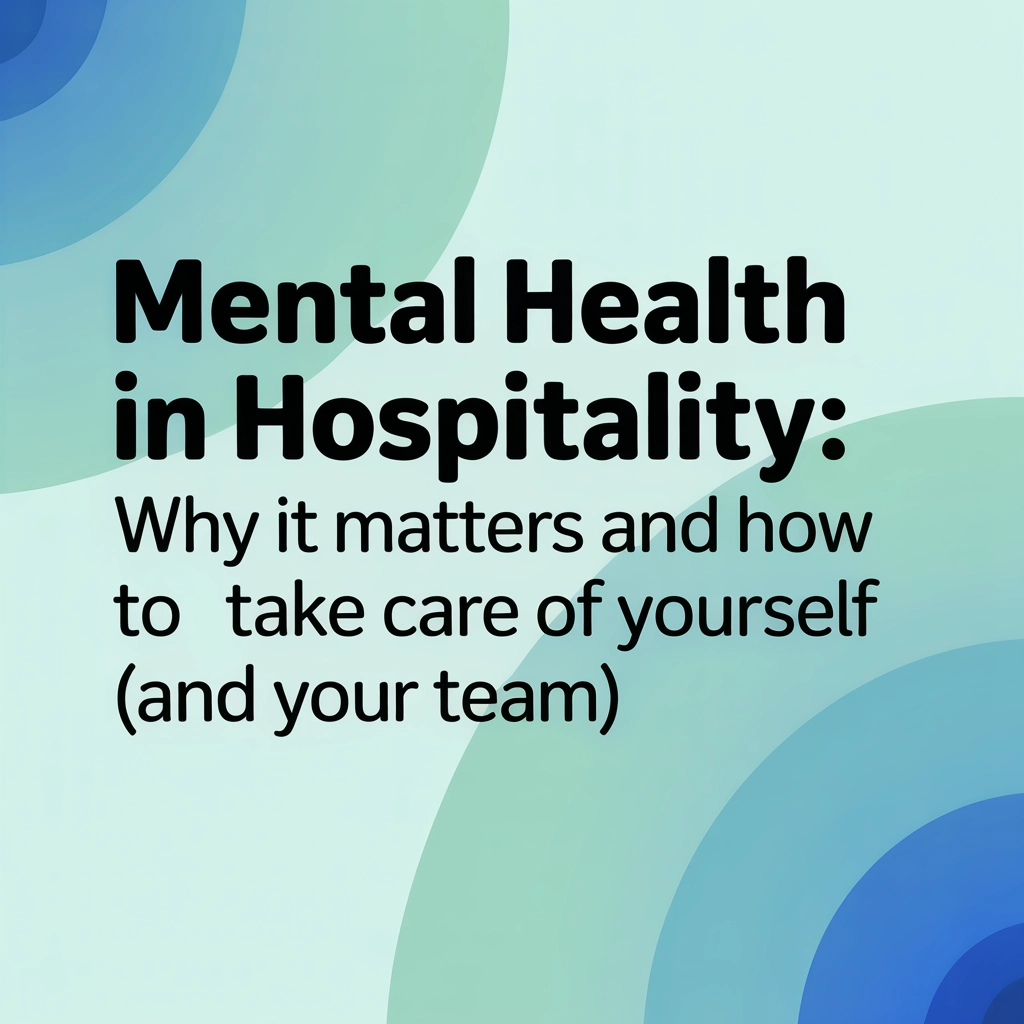Mental Health in Hospitality: Why It Matters and How to Take Care of Yourself (and Your Team)

Let's talk about something that's been weighing on all of us in hospitality, mental health. It's not exactly the cheeriest topic for a Tuesday morning, but it's one we can't keep pushing to the side.
Here's the reality: 76% of hospitality workers are struggling with mental health issues right now. That's up from 56% just six years ago. If you're reading this and nodding along, thinking "yeah, that sounds about right," you're not alone. And more importantly, you're not stuck.
Why Mental Health in Hospitality is a Crisis (Not Just a Challenge)
The numbers don't lie. Our industry has become ground zero for workplace mental health struggles, and it's getting worse, not better.
The main culprits hitting our people hardest:
- Work-life balance issues (60% of workers report this)
- Direct mental health struggles (44%)
- Financial pressures (42%)

But here's what the statistics don't capture: the daily reality of working in hospitality. The smile you paste on when dealing with that impossible guest. The extra shifts you pick up because your colleague called in sick (again). The pressure to be "on" every single moment you're clocked in.
We're dealing with what psychologists call "emotional labor": constantly managing your feelings and expressions for work. And frankly, it's exhausting.
The Unique Stressors That Make Hospitality Different
Working in hospitality isn't like working in an office. Our challenges are specific, intense, and often misunderstood by people outside the industry.
Here's what we're really dealing with:
Shift work that messes with your biology. Your body was designed for regular sleep patterns. When you're working nights one week and early mornings the next, your circadian rhythm goes haywire. Studies show hospitality workers experience 40% higher rates of anxiety, depression, and sleep disturbances compared to other industries.
The customer is always right mentality. Even when they're clearly wrong. This constant emotional regulation takes a toll. You absorb other people's bad moods, complaints, and sometimes outright hostility: all while maintaining that professional smile.
Unpredictable schedules. How do you plan a social life, maintain relationships, or even just go to the doctor when your schedule changes weekly? This unpredictability creates chronic stress that extends far beyond work hours.
Physical demands on top of emotional ones. Long hours on your feet, lifting, carrying, running around. Your body hurts, you're exhausted, but you still need to be mentally sharp and emotionally available for guests and colleagues.
Taking Care of Yourself: Non-Negotiable Strategies
Look, I get it. When you're barely keeping your head above water, "self-care" can feel like another item on an impossible to-do list. But think of it this way: you can't pour from an empty cup.

Sleep Hygiene is Your Superpower
Even with crazy shift patterns, you can improve your sleep:
- Keep your bedroom as dark as possible (blackout curtains are worth the investment)
- Use a white noise app to block out daytime sounds
- Try to maintain the same sleep routine, even if the timing changes
- No screens for at least 30 minutes before sleep (yes, even after a late shift)
Create Micro-Moments of Calm
You don't need an hour-long meditation session. Try these:
- Three deep breaths before entering a guest room
- Five minutes in your car before your shift starts
- A short walk around the building during your break
- Keep a small stress ball or fidget tool in your pocket
Set Financial Boundaries
Money stress amplifies everything else. Here's the uncomfortable truth: if you're consistently undervalued and underpaid, it's affecting your mental health.
What you can control:
- Track your accomplishments and quantify your value
- Research what others in your role are earning
- Have the compensation conversation with concrete examples
- Don't work for free: your time off is sacred
Supporting Your Team: Leadership Strategies That Actually Work
If you're in a leadership position, your team's mental health isn't just HR's job: it's yours. And the good news? Every dollar you invest in mental health support returns $2.18 to your business within three years.

Create Psychological Safety
Your people need to know they can speak up without consequences:
- Regular one-on-ones that go beyond operational topics
- Ask "How are you holding up?" and actually listen to the answer
- Train your management team to recognize signs of burnout
- Make mental health days as normal as sick days
Address the Root Causes
Don't just treat symptoms: fix the problems:
- Review your scheduling practices. Are you creating unnecessary chaos?
- Ensure adequate staffing. Chronic understaffing is a mental health hazard
- Look at your workplace culture. Is it competitive or collaborative?
- Give people control where possible: even small choices matter
Normalize Mental Health Support
Make seeking help feel routine, not dramatic:
- Share mental health resources regularly, not just during Mental Health Awareness Month
- Talk openly about stress management and coping strategies
- Bring in mental health professionals for workshops
- Lead by example: share your own strategies for managing work stress
Building Better Workplaces: The Long Game
This isn't about quick fixes. We need to fundamentally shift how our industry thinks about employee wellbeing.
The hospitality leaders who get this right are:
- Investing in proper training on emotional intelligence and stress management
- Creating career development paths so people see a future, not just a job
- Building teams that support each other instead of competing
- Recognizing that employee wellbeing directly impacts guest experience

Remember: A stressed, burned-out team can't deliver exceptional service. When you invest in mental health, you're not just being nice: you're being smart.
The Permission You Need to Hear
Here's what I want you to know: It's okay to not be okay.
If you're struggling, you're not weak. You're not failing. You're human, working in an industry that demands a lot from its people.
Getting help isn't giving up: it's gearing up. Whether that's talking to a counselor, joining a support group, or simply having an honest conversation with your manager about workload, taking that step is courageous.
For leaders: Your vulnerability creates space for your team's honesty. Share your struggles (appropriately) and your coping strategies. Show them that strong leaders get support too.
The hospitality industry has always prided itself on taking care of others. Now it's time we extend that same care to ourselves and each other. Your mental health matters. Your team's mental health matters. And together, we can build a stronger, more sustainable industry: one conversation, one boundary, one act of self-care at a time.
What's one small step you'll take this week to prioritize mental health: either yours or your team's? Start there. You've got this.
Career coaching for hospitality professionals
Need clarity on your next move? As a hospitality career coach I help managers and leaders design the next step in their careers — practical, honest, and tailored to you.
